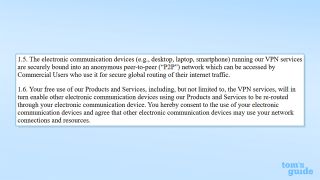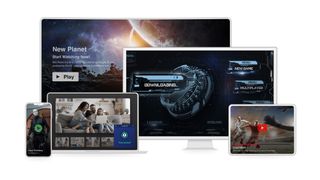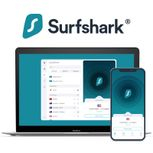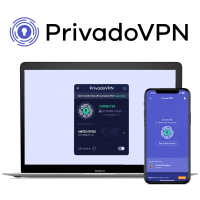This VPN sells access to people's home internet networks
It may seem like a great deal, but you could get more than you bargained for with this VPN

Free VPN service Big Mama VPN might be a VPN to be avoided. It has emerged that the provider is selling access to user's home internet connections, allowing strangers to use your IP address.
We would never recommend a VPN that has the potential to leave you compromised in this way, with all the providers featured in our best VPN list offering top-class privacy and no-logs policies.
How have these issues occurred?
The issues centre around the VR game Gorilla Tag. Players have found a way to cheat and get ahead in the game by installing a VPN onto Meta's VR headsets, which introduces a delay and makes it easier for players to sneak up and "tag" opponents. Users have uploaded video tutorials detailing how this is done, and what steps to follow.
Whilst we don't condone in-game cheating, that aspect of this issue is fairly harmless, albeit a little annoying. What is worrying is that the VPN used in video tutorials is a service called Big Mama VPN.
It has emerged that Big Mama sells access to its free user's home internet connections, and buyers can "piggyback" on the VR headset's IP address to hide their own online identity.
The technique is known as "residential proxy." Residential IP addresses are far easier to pass off as regular internet traffic, and for that reason they have become increasingly popular with cybercriminals of late. Criminals can use proxy networks to conduct cyberattacks and use botnets.
Too good to be true?
Big Mama's free VPN app is available on the Google Play Store for Android devices. However, users can also access the Big Mama Proxy Network, which allows them (amongst other things) to buy shared access to "real" 4G and home Wi-Fi IP addresses for as little as 40 cents for 24 hours.
Big Mama appears to be a popular choice as it claims to offer a free service requiring no sign-ups and has no data limits. This seems suspicious as the best free VPNs, which are safe and secure, often have data or device limits with the best features are reserved for paid VPN services.
It is vital to read a VPN provider's terms and conditions and privacy policies, as you can inadvertently end up agreeing to have your device used in a proxy network.
Big Mama VPN doesn't hide the fact that users will have external traffic routed through their network. Within the app's FAQs it says: "The devices of our free VPN customers are used to create a secure peer-to-peer network that our commercial clients can use securely to route their traffic via various global endpoints."
It goes on to say that "as a free client, you will likely not notice any impact on your resources as that happens. The data transferred in the background will be metered by your mobile operator according to your data plan."
This is also mentioned multiple times in Big Mama VPN's Terms of Use and states users can opt-out at any time by becoming a "commercial user."

Are all free VPNs dangerous?
No, not all free VPNs are dangerous, however you should exercise caution when searching for a free VPN provider as there are many unsafe services on the market – including fake free VPNs.
There are some great free VPNs available which provide reliable and safe device connections, and we have detailed our recommended free VPNs in our ranked list.
Our two top free VPN choices come from established providers and are free versions of their paid plans. They don't offer the range of features their paid counterparts do, but they offer excellent speeds, solid security, and are a more than capable VPN.
PrivadoVPN Free is our number one choice. It's great at unblocking content and super fast, achieving speeds of up to 900 Mbps in our testing – making it one of the fastest VPNs we've tested.
It's an easy-to-use VPN and you get a data limit of 10 GB a month. This might not be enough if you're a hardcore streamer, but for everyday web browsing, this is more than enough.
Due to it being free, there are some downsides. You can only support one device and there aren't a lot of features. There isn't a huge number of server choices, with Privado offering 13 locations in 10 countries. However, for a free service, the spread isn't bad.

Proton VPN Free is rated as our second-best free VPN. It is run by well-known security company Proton and as a result comes with top-tier privacy and security credentials. There are no essential privacy features held back, and features include a kill switch and Proton-owned servers – meaning no third-parties are exposed to your data.
Proton VPN Free isn't as fast as PrivadoVPN Free, but its speeds are still more than good enough for streaming and browsing. Proton VPN Free's unlimited data policy means you will be protected online at all times, no matter what.
The biggest downside to Proton VPN Free is its servers. There are only five locations in five countries, and you can't select what location you wish to connect to. If you don't connect to where you want the first time, you'll have to keep disconnecting and re-connecting until you're connected to where you want to be.
Alternatives to free VPNs
If you're on a strict budget, and a free VPN is your only option, then you can't go wrong with the two mentioned above. However, if you're open to a paid plan, there are some very affordable options.
Surfshark tops our best cheap VPN list, and is the fastest VPN we've tested. It can reach speeds of over 950 Mbps and is one of the best streaming VPNs. You can protect an unlimited number of devices and it boasts a wide range of apps and features. 2-year plans start at $1.99 per month.
Surfshark | 2 years + 4 months FREE | $1.99 per month
Surfshark sits at #2 in our best VPN list and is the best cheap VPN out there, as well as being the fastest VPN we've tested. In our testing, it hit speeds of over 950 Mbps and is great for streaming. It boasts top-class privacy and antivirus, and you can protect an unlimited number of devices. There are some nice additional features, including Alternative ID and Alternative Number. The 2-year plan starts at $1.99 per month ($55.72 up front) and includes an extra 4 months of protection for free and a 30-day money-back guarantee.
PrivadoVPN offers a paid version, which is just $1.11 per month, and offers all the features of the free version plus more. The fast speeds don't drop off with the paid version, and you get over 300 servers in 48 countries. It is great for streaming and you can protect up to 10 devices.
PrivadoVPN | 2 years + 3 months FREE | $1.11 per month
PrivadoVPN is unbelievably cheap, and for that you get a solid, reliable, and very quick VPN. Speeds of over 900 Mbps in our testing make it one of the fastest VPNs out there, and thanks to its top-level unblocking capabilities, it's great for streaming. It has very high levels of privacy and is our number one free VPN choice. The 2-year plan starts at $1.11 per month ($30 up front) and comes with 3 extra months of protection for free and a 30-day money-back guarantee.
Almost all of the best VPN providers offer a 30-day money-back guarantee, so if you're unsure about parting with your money, then you can try out your VPN of choice risk-free. It is also worth noting that ExpressVPN, our number three VPN overall, offers a 7-day free trial, so you don't have to part with any money at all. Although, if you do enjoy it, ExpressVPN isn't the cheapest option at $4.99 per month.
There are some other affordable providers on the market, Private Internet Access (PIA) works out at $2.19 per month, IPVanish is also $2.19 per month, and the best VPN overall, NordVPN, starts at $2.99 per month.
Disclaimer
We test and review VPN services in the context of legal recreational uses. For example: 1. Accessing a service from another country (subject to the terms and conditions of that service). 2. Protecting your online security and strengthening your online privacy when abroad. We do not support or condone the illegal or malicious use of VPN services. Consuming pirated content that is paid-for is neither endorsed nor approved by Future Publishing.

George is a Staff Writer at Tom's Guide, covering VPN, privacy, and cybersecurity news. He is especially interested in digital rights, censorship, data, and the interplay between cybersecurity and politics. Outside of work, George is passionate about music, Star Wars, and Karate.
-
nyankana Maybe for the extreme gullible age groups as the teens, but I am not sure who in their right mind would look at the name of the VPN and doesn't even think the name itself already sounds off a big red flag...Reply

